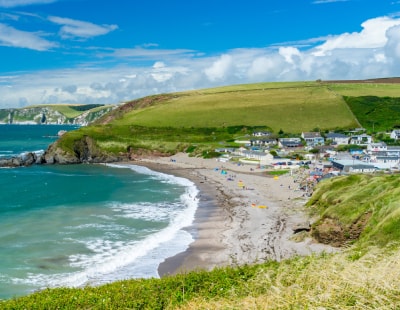
Another west country tourist hotspot looks set to ban any future new-build home being sold as a holiday or additional property.
Bigbury parish in the South Hams lies almost entirely within the South Devon Area of Outstanding Natural Beauty and has seen average prices accelerate in the past decade, considerably faster than those of most other parts of Devon.
In 2007 some 79 per cent of respondents to a parish plan said their home was the principal residence; this fell to 65 per cent by 2016 and in one specific area - Bigbury-on-Sea - only 48 per cent of respondents to the latest survey stated that their home in the area was their principal residence.
Now councillors in the wider South Hams district are this week expected to endorse the Bigbury Neighbourhood Plan, which places a ‘principle residency only’ condition on all new residential property in the parish.
A Bigbury Plan spokeswoman told the Devon Live website: “The Parish Vision is ‘to conserve and enhance the unique and special character of our rural and coastal community retaining its heritage significance and its outstanding natural beauty, whilst considering sensitive enhancements for the benefit of residents and visitors.
“The Plan proposes a small housing development of 13 dwellings … which includes eight affordable dwellings for rent or discount purchase. This primarily affordable housing scheme has been designed to provide for the local needs of the parish and to remain affordable to local people in the future.
“The new housing was proposed in the most sustainable location to meet the community’s own housing needs and that the plan provides controls to ensure that the new homes that are built will only be used as ‘principal residences’.”
A small number of other westcountry locations have already introduced this measure but in one area - St Ives - it is thought to have worsened the housing problem rather than helped.
Back in 2016 a referendum in St Ives ended with a ban on the sale of new-build flats and houses to second home buyers; a legal challenge later in the year failed, prompting a series of other referendum votes with similar results in some other westcountry locations.
At the time some estate agents and developers warned of unintentional consequences of the ban, both in St Ives and elsewhere.
A recent survey by the London School of Economics says the St Ives ban, and similar ones in a handful of other resorts in Britain - all applying only to new-build properties - have been damaging to the local construction and tourism industries.
“This has led to an increase in the price of existing homes as summer dwellers are competing for existing homes with local residents” according to Professor Christian Hilber of the LSE.
“Tourist towns can restrict second home investors with possibly positive effects on affordability, but this comes at the cost of a significant adverse effect on the local economy.”









.jpg)







%20-%20IMAGE%20Client%20Accounting%20%E2%80%93%20what%20are%20your%20options.jpg)


.png)
.png)
.png)
%20(002).png)






%20(002).jpg)





%20A%20property%20tale%20for%20our%20times.png)








Join the conversation
Jump to latest comment and add your reply
Living and working in Devon and an active part of the community, as are lots of us I see the problems with second homes every day. There are second home owners who buy to retire in a few years' time and there are those who use them for a large proportion of the year, but a large number of them are let out to holidaymakers who fill up at Tesco on the way down and never set foot in the the local village shop (where there is still one) and barbecue on the terrace rather than using the local pub (where there is still one) and these properties are left empty for much of the time. A generalisation I know, but when you see the number of primary schools in Devon and Cornwall which have closed due to the reduction in families living in the catchment area, you know there is a serious problem which needs fixing.
Putting residence restrictions on new homes is no big deal to the market or to us as estate agents, because over 95% of properties in nearly all communities will not be affected at all and the new, permanent owners will bring a much needed injection of normality into the areas. I dispute the LSE figures which do not translate into what is happening on the ground and it does not make economic sense for them to say that this "has led to an increase in the price of existing homes as summer dwellers are competing for existing homes with local residents", because local residents cannot afford the existing homes - that is the whole point of the exercise!. There will be restrictions in perpetuity on these homes (much like the "Devon rule" which states that most ex-council houses can only be sold to people "living or working in Devon for the last 3 years") so this isn't a temporary fix that subsequent home owners can make money from.
Prof Christian Hilber is a renowned Swiss economist who has worked in Germany and he spent much of his time in the USA before joining the LSE. He seems to have an internationalist approach to economics which tends to ignore local factors.
Hi Richard
I am sorry to disagree with such an experienced local South Hams agent but Hilber is right, I'm afraid.
Just to put this all in context, Bigbury is adjacent to Salcombe which voted for this restriction of locals only to fresh grants of planning consent about a year ago. The whole area is known as the South Hams and prices down here are high!
However; residential property development has made a very significant contribution to the local South Hams economy over the last 30 years and you can't say you and your firm haven't benefited from the fees generated!
Whilst I don't want to generalise either, many locals benefit by selling their homes for significant premiums to wealthy 'M25 buyers'.
Many locals provide services to second home owners, in fact its the only sector that has significantly grown in the last 30 years.
And yet that old envy thing, and dislike of incomers rears its ugly head and residents support restrictive development policies which will apply to new second homes.
They will be worse off for it and whether Hilber has worked in Switzerland, Germany, the US or the outer Hebrides, it doesn't make a jot of difference, evidence is evidence.
Hi Andrew. Long time no speak. I hope Lockdown is treating you not too badly!
Bizarrely, I mentioned Salcombe as an exception in my draft but deleted it as I thought it best not to mention any individual area; you know Salcombe better than anyone and I appreciate your comments. However, estate agents down here have benefited as much from the sale of houses with residency restrictions as others, and the turnover of these tends to be higher than holiday homes although the commission received from the sale of them is less. I've sold a lot more ex-council houses in the South Hams than second homes over the years. Local builders and traders benefit from them also. Envy doesn't come into the argument and I have to say that Hilber is a bit of a bland internationalist who tends to ignore local economics even if a brilliant brain!
Please login to comment